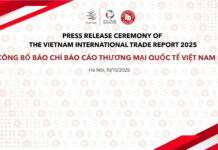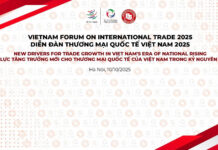On May 26, 2025, Foreign Trade University (FTU) successfully organized the Workshop titled “Industrial Policy in the Context of Sustainable Development” in a hybrid format (offline and online), under the framework of the WTO Chairs Programme (2022-2026).

The seminar welcomed the participation of speakers from reputable research and academic institutions, including Professor Fabio Gaetano Santeramo (University of Foggia and the European University Institute) and Ms. Trần Bình Minh – Deputy Head, Department of Sectoral Policy Studies, Institute for Policy and Strategy. In addition, the event was honored to host representatives from the Vietnamese Delegation in Geneva, along with a broad audience of researchers, policymakers, and experts with a strong interest in industrial policy in the context of sustainable development.
From FTU, participants included Assoc. Prof. Dr. Trinh Thi Thu Huong – Director of the WTO Chairs Programme at FTU (FTU-WCP); Dr. Vu Kim Ngan – Deputy Director of FTU-WCP; heads and deputy heads of various university departments, FTU-WCP members, lecturers, and students.
In her opening remarks, Assoc. Prof. Dr. Trinh Thi Thu Huong emphasized the growing importance of industrial policy in promoting economic growth while aligning with sustainable development goals. Amid global shifts such as the green transition, digital transformation, and supply chain restructuring, industrial policy must be redefined not only to enhance national competitiveness but also to ensure social equity and environmental protection.

The workshop comprised two parts: a presentation session and Q&A discussion.
The first presentation was delivered by Prof. Fabio Gaetano Santeramo (University of Foggia and European University Institute), titled “Trends and Approaches to Developing Industrial Policy in the Context of Sustainable Development”. In his presentation, Professor Santeramo outlined emerging trends and contemporary approaches to formulating modern industrial policy. He reviewed the historical shift from traditional import substitution models to strategies that emphasize public investment, foreign direct investment (FDI), and the restructuring of global value chains. Against the backdrop of global challenges such as economic instability, climate change, and technological transformation, industrial policy is increasingly expected to serve as a foundational pillar for promoting growth, driving structural transformation, and modernizing the economy in line with sustainable development goals. Professor Santeramo also underscored the growing importance of industrial policy in facilitating energy transition and decarbonization, illustrated through specific policy examples from the United States, the European Union, and several emerging economies.
Next, Associate Professor Dr. Trinh Thi Thu Huong – Vice Dean of the School of Economics and International Business, and Director of the FTU – WTO Chairs Programme – delivered a presentation on “Experiences in Developing and Implementing Industrial Policy in Selected Countries”. Her presentation analyzed industrial policies from six countries, ranging from developing to developed economies, namely: Japan, Germany, South Korea, China, Thailand, and Indonesia. It also compared the approaches of these countries to draw lessons for Vietnam in designing and implementing industrial policies that align with domestic conditions and the context of sustainable development in the coming period. The experiences from these six countries are diverse, focusing on key areas such as: formulating industrial and technological development strategies/plans (often in five-year cycles); the leading role of the state or state-owned enterprises; public-private partnerships (PPP); human resource development and training; support policies for small and medium-sized enterprises (SMEs); development of industrial clusters; promotion of innovation; attraction of foreign direct investment; and adjustments in domestic firms’ participation in rare-resource supply chains. Notably, five out of the six countries emphasized that policies supporting human resource training for industrial development are essential and indispensable. In the current context, human resource training for industrial development requires increasingly advanced information technology skills. Locating training institutions near industrial zones and clusters is also a practical lesson worth considering.

The final presentation was given by Ms. Tran Binh Minh, Deputy Head, Department of Sectoral Policy Studies, Institute for Policy and Strategy. Her talk, titled “Industrial Policy in Vietnam: Recent Developments and Way Forwards”, offered a thorough analysis of the current context, main pillars, achievements, and future orientations of Vietnam’s industrial policy. In response to urgent needs such as industrialization, deep global economic integration, green transition, supply chain restructuring, and the Fourth Industrial Revolution, Vietnam has shaped its industrial policy around several pillars: developing priority and high-tech industries (electronics, semiconductors, AI, ICT, renewable energy); improving the investment environment and attracting high-quality FDI with technology transfer; enhancing human resources quality, especially in new technology sectors; and promoting innovation and R&D, including support for startups and innovation ecosystems. Notable results include stable industrial production growth (averaging 6.98% during 2011-2023), strong contributions from manufacturing to exports (over 85%), and Vietnam’s ranking among the top 30 countries with upper-middle industrial competitiveness. However, significant challenges remain, such as FDI dependency, weak supporting industries, limited skilled labor, and fragmented policy frameworks. The proposed future directions emphasize long-term strategic visioning, fostering FDI-domestic linkages, investing in vocational training, institutional reform, supporting green enterprises, and strengthening innovation capacity – all aiming toward a sustainable, modern, and resilient industrial sector.

The open discussion and Q&A session that followed was lively, with active participation from attendees. Discussions focused on public-private collaboration in policy design and implementation, integrating sustainability goals into industrial policy, and identifying suitable policy tools for a transitioning economy like Vietnam.

In closing, a representative from FTU extended sincere thanks to the speakers, participants, and delegates for their contributions to a valuable academic forum, which provided important insights for improving industrial policy toward sustainable national development.










